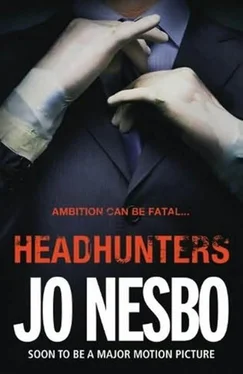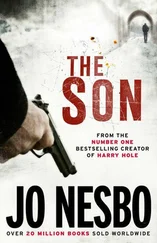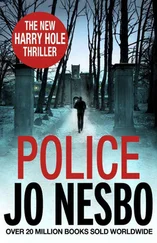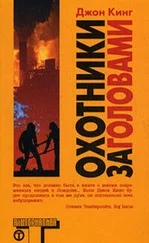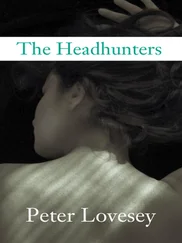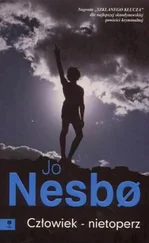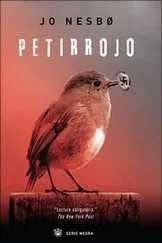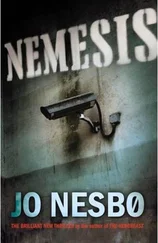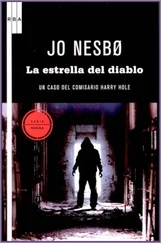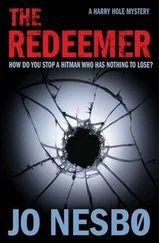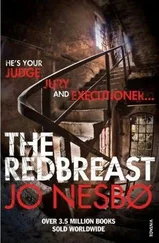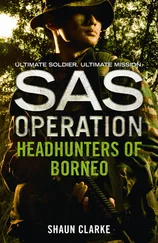As I inhaled, my nose, mouth and lungs were filled with solvents: latex paint, varnish and glue.
I stepped over the paint pots and the rolls of wallpaper in the hall. Grey protective paper on chequered oak parquet floor, wainscoting, brick dust, old windows that were clearly going to be replaced. Rooms the size of small ballrooms in a line, one after the other.
I found the half-finished kitchen behind the middle room. Strict lines, metal and wood, expensive, no doubt about that; I guessed it was a Poggenpohl. I went into the maid’s room, and there was the door behind the shelves. I had already taken into account that it might be locked, but I knew that if necessary there would be tools in the apartment I could use to break it open.
It wasn’t necessary. The hinges creaked a warning as the door opened.
I stepped into the dark, empty, rectangular room, took the pocket flashlight from inside my overalls and shone the pale yellow light on the walls. There were four pictures hanging in there. Three of them were unknown to me. The fourth was not.
I stood in front of it and felt the same dryness in my mouth as when Greve had mentioned the title.
‘ The Calydonian Boar Hunt .’
Light seemed to be forcing its way out of the underlying, 400-year-old layers of paint. Together with the shadows it gave the hunting scene an outline and form, what Diana had explained to me was called chiaroscuro. The picture had an almost physical impact, a magnetism that drew you in, it was like meeting a charismatic person you have only known from photos and hearsay. I was unprepared for all this beauty. I recognised the colours from earlier, better known hunting pictures of his in Diana’s art books – The Lion Hunt, The Hippopotamus and Crocodile Hunt, The Tiger Hunt . In the book I had read yesterday it had said that this was Rubens’s first hunting motif, the departure point for later masterpieces. The Calydonian boar had been sent by Artemis to murder and ravage in Calydon in revenge for humanity’s neglect of the goddess. But it was Calydon’s best hunter, Meleager, who killed the boar with his spear in the end. I stared at Meleager’s naked muscular torso, the hate-filled expression that reminded me of someone, at the spear entering the beast’s body. So dramatic and yet reverent. So naked and yet secretive. So simple. And so valuable.
I lifted the picture, carried it into the kitchen and placed it on the bench. The old frame had, as I assumed it would, a canvas stretcher attached to the back. I produced the only two tools I had brought with me and needed: an awl and wire cutters. I snapped off most of the tacks, pulled out those I would reuse, slackened the stretcher and used the awl to force out the pins. I fumbled more than I usually do; perhaps Ove had been right about motor coordination skills after all. But twenty minutes later the reproduction was finally in position in the frame and the original in the portfolio.
I hung up the picture, closed the door behind me, checked that I had not left any clues and left the kitchen with a sweaty hand round the portfolio handle.
Walking through the middle room, I cast a glance out of the window and caught a glimpse of a semi-stripped crown of a tree. I stopped. The glowing red leaves that remained made the tree look as if it were aflame in the oblique rays of sunlight that leaked out between the clouds. Rubens. The colours. They were his colours.
It was a magical moment. A moment of triumph. A moment of metamorphosis. In such a moment you see everything so clearly that decisions which had seemed fraught with difficulty before suddenly appear as self-evident. I was going to become a father, I had planned to tell her tonight, but I knew now that this was the right moment. Now, here, at the scene of the crime, with Rubens under my arm and this beautiful, majestic tree before me. This was the moment that should be cast in bronze, the eternal memory Diana and I should share and take out on rainy days. The decision that she, unsullied, would believe was taken in a moment of lucidity and for no other reason than love for her and our child-to-be. And only I, the lion, the paterfamilias, would know the dark secret: that the zebra’s throat had been savaged after an ambush, that the ground had been bloodied before the prize had been laid before them, my innocents. Yes, that’s how our love should be consolidated. I took out my phone, removed one glove and selected the number of her Prada phone. I tried to formulate the sentence in my head while waiting to be connected. ‘I want to give you a child, my darling.’ Or: ‘My darling, let me give you…’
John Lennon played his G11sus4 chord.
‘It’s been a hard day’s night…’ So true, so true. Elated, I smiled.
But in a flash I understood.
That I could hear it.
That something was wrong.
I lowered my phone.
And in the distance, but clear enough, I heard the Beatles beginning to play ‘A Hard Day’s Night’. Her ringtone.
My feet were cemented to the grey paper on the ground.
Then they began to move in the direction of the sound, my heart like the heavy beat of kettle drums.
The sound came from behind a half-open door to the corridor on the far side of the reception rooms.
I opened the door.
It was a bedroom.
The bed in the middle of the room was made but had obviously been slept in. At the foot lay a suitcase, and beside it was a chair with some clothes draped over the back. A suit hung on a hanger in the open wardrobe. The suit Clas Greve had worn at the interview. From somewhere in the room Lennon and McCartney were singing in unison with an energy they were never to regain on subsequent records. I looked around. And knelt. Bent down. And there it was. The Prada mobile phone. Under the bed. It must have slipped out of her pocket. Presumably as he tore her trousers off. And she had not realised the phone was gone until… until…
I visualised her tempting backside this morning, the furious search through clothes and handbag.
I stood up again. Much too quickly, I suppose, for the room began to whirl around. I stuck out a hand against the wall.
The answerphone cut in, and there was her chirrupy voice.
‘ Hi, this is Diana. I haven’t got my phone to hand… ’
True enough.
‘ But you know what to do …’
Yes, I did. My brain had registered somewhere that I had used the ungloved hand to support myself, and that therefore I would have to remember to wipe the wall.
‘ Have a brilliant day !’
That might be difficult, though.
Beep.
PART THREE Second Interview
MY FATHER, IAN BROWN, was a keen, though not a very good, chess player. He had been taught to play by his father when he was five, and he read chess manuals and studied classic games. However, he didn’t teach me to play chess until I was fourteen, when my most receptive years were over. I had an aptitude for chess, though, and when I was sixteen I beat him for the first time. He smiled as though he were proud of me, but I know he hated it. He reassembled the pieces and we began a revenge match. I played with the white pieces as usual; he tried to make me believe that he was giving me an advantage. After a few moves he excused himself and went into the kitchen, where I knew he took a swig from a bottle of gin. When he returned I had swapped two pieces, but he didn’t realise. Four moves later he sat gawping at my white queen opposite his black king. And he saw that the next move would be checkmate. He was so funny to look at that I couldn’t restrain myself and started to laugh. And I could see from his expression that he knew what had happened. He stood up and swept all the pieces off the board. Then he hit me. My knees gave way and I fell, more out of terror than the force of the blow. He had never hit me before.
Читать дальше
